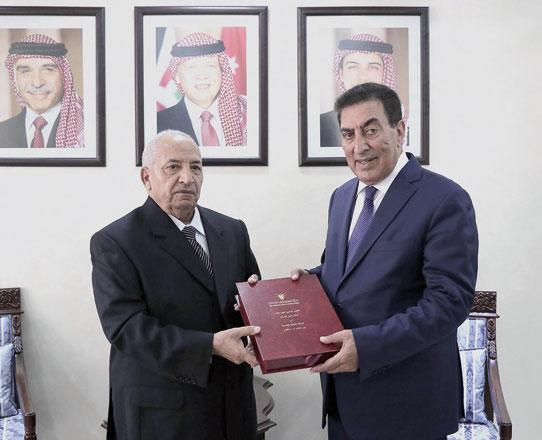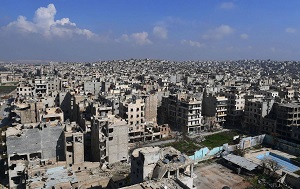Human rights report cites continued violations in 2017

The Jordan Times
AMMAN — Corruption is “rooted in the national culture”, especially favouritism and nepotism, which many citizens resort to “secure their basic rights” and the uneven development process in the Jordanian governorates, as well as unfair distribution of gains, especially in governorates far from the capital Amman.
These remarks were made by the Commissioner General of the National Centre for Human Rights (NCHR) Mousa Burayzat at a press conference held at the NCHR’s premises on Monday to announce the 2017 report on human rights situation in Jordan, which addressed all aspects of the issue during last year, including improvements and shortcomings.
Chairperson of the National Centre for Human Rights’ Board of Trustees Mohammad Bakhit had presented a copy of the report to His Majesty King Abdullah a day before, and to House Speaker Atef Tarawneh yesterday, the Jordan News Agency, Petra, reported.
Burayzat pointed out that there were no serious measures taken to develop legislation concerning the criminalisation of torture, except for the Article 208 of the Penal Code and its 2017 amendments, whereby the minimum sentence for the crime was increased from three to six months.
He also pointed to the deficiencies that still exist in legislation concerning the criminalisation of torture and impunity, adding that the NCHR received 85 complaints in 2017 from citizens concerning allegations of torture and mistreatment by law enforcement officers and various security services, compared with 63 complaints received in 2016.
On the right to freedom and personal safety, the NCHR’s report praised the amendment of legislation related to enhancing fair trial of persons deprived of their liberty in the initial investigation phase in 2017.
The report underlined that NCHR detected cases when security departments continued to resort to the controversial Prevention of Crimes Law No. (7) of 1954, which allows administrative governors to take measures against people with criminal records citing security considerations and public security.
The NCHR stressed an improvement in the prison environment at the temporary detention centres. However, in 2017, while conducting visits to prisons (of which 34 were unannounced), NCHR noticed shortcomings such as the prolonged pre-trial detention exceeding (24) hours, when the suspects are kept in custody for prolonged periods based on the Prevention of Crimes Law, and sometimes totally illegally.
The report said that there are still a number of challenges to the citizens’ right to a fair trial, with the number of complaints received by the NCHR in 2017 concerning the right to a fair trial standing at (57), mostly revolving around prolonged judicial detention and rejection of release on bail requests and appeals against certain judicial proceedings.
On the freedom of opinion and expression, the report referred to amendments to a number of legislation relating to the right to freedom of opinion and expression in 2017, which included the amendment of article (68/H) of the Civil Service By-law to add a new constraint on employees in the context of expressing their opinion, using “Loose wording” to described banned acts, such as “insulting the country” in social media posts.
The report also pointed out a rise in the case of detention and prosecuting individuals for speaking out on social media platforms, their participation in sit-ins and protests or expressing their opinion by using other means.
On the right to assembly, NCHR cited a number of bans issued by administrative governors of public gatherings, while this approach did not prevent people from staging peaceful marches and demonstrations in protest against the policies and practices of the government.
On the right to form and join associations, the report said that the dialogue between the partners (the government and civil society organisations) on the law of forming associations was still under way, but the government “did not move forward in taking the necessary procedures to endorse the draft law amending the Law of Associations in 2017”.
NCHR emphasised the absence of a single specific authority to oversee the work of the associations, which led to the absence of uniformity in related policies.
NCHR underlined a shortage in manpower regarding the inspection campaigns carried out by the Ministry of Labour teams and the violations that they report against the employers.
Despite increasing the number of inspection visits and appointing new inspectors, they remain insufficient to address the violations against workers, while employees at Qualifying Industrial Zones suffered in some cases unfair disciplinary measures, humiliation, overcrowding dorms, low wages, extra working hours, delayed salaries, the absence of social and health protection in many work places and ban from access to rights and employment contracts.
On the right to education, the NCHR teams observed cases of bad conditions of school buildings, a shortage of teachers, desks and whiteboards in classrooms “in most schools”, overcrowded classrooms, the deterioration in the hygienic situation and the lack of several facilities such as heating, fans and playgrounds.
The report mentioned some positive developments in terms of supporting women’s rights, most important of which is women’s quota in elected councils.
NCHR monitored the conditions of persons with disabilities in the care centres, rehabilitation and vocational training, which suffer from the lack of centres for care, rehabilitation and vocational training for persons with disabilities and the absence of appropriate geographical distribution in the governorates of the Kingdom.
On the rights of elderly people, NCHR revealed that 2017 witnessed no updates to the laws and regulations governing the rights of elderly people, which NCHR considers inadequate and lack provisions that secure the rights of the elderly people outside care institutions, such as the right to employment, the healthcare and physical integrity, in addition to the need to adjust these the laws and regulations to conform to international standards.
Latest News
-
 Cabinet suspends mandatory retirement rules, approves funding measures
Cabinet suspends mandatory retirement rules, approves funding measures
-
 Lebanon state media says 3 killed in Israeli strike on vehicle near Sidon
Lebanon state media says 3 killed in Israeli strike on vehicle near Sidon
-
 Syria State Media Says Kurdish Force Shelling Kills One Person in Aleppo City
Syria State Media Says Kurdish Force Shelling Kills One Person in Aleppo City
-
 Crown Prince chairs meeting to review programme on combating littering
Crown Prince chairs meeting to review programme on combating littering
-
 King congratulates Morocco monarch on football team’s 2025 Arab Cup win
King congratulates Morocco monarch on football team’s 2025 Arab Cup win